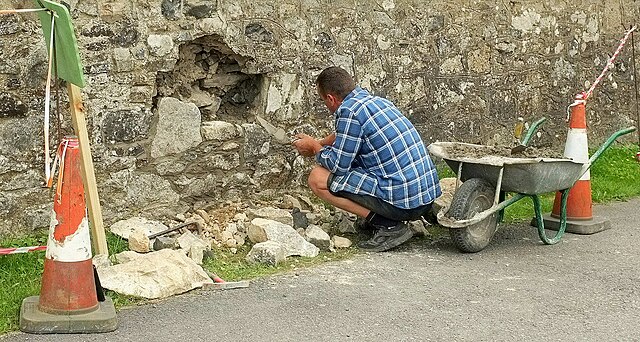I recently heard it mentioned on a podcast that the Chartres Cathedral took 250 years to build. I looked it up. That’s not quite true. For one thing, many cathedrals have stood on this site, with fire destroying or seriously damaging each one. The official Chartres Cathedral website tells us the current building was largely built between the years 1134 and 1260, a period of 126 years. Not 250 years, but still a long time.
The mention of the cathedral drove me to the Google machine to look at it on a map. It had occurred to me that I have often seen pictures of the cathedral, mostly from the inside, but I’d never really looked it up. For one thing, I only vaguely knew where Chartres was. I found it easily on Google Maps and went to Street view. Two things struck me. First, at least on the map, the neighborhood in which the cathedral sits seems nondescript. This is unlike some impressive similar churches that I have seen in person, such as Westminster Abbey in London, St. Patrick’s Cathedral in New York, and St. Peter’s Basilica in Rome. Of course, those churches are in major cities. Chartres, by contrast, lies about fifty miles from Paris and has only 37,000 residents, not much more than my small South Dakota hamlet.
I also noticed that, at the time the Street View images were captured, parts of the cathedral were covered in scaffolding. One imagines this is a constant condition. Buildings of such age inevitably require ongoing preservation. In that sense, perhaps the true construction of Chartres Cathedral has never really ceased. One could argue this magnificent structure has been in the making for over a millennium.
Even though the 250-year claim turned out to be inaccurate, what initially struck me is its congruence with a celebration kicked off with our recent celebration of Independence Day, namely the yearlong recognition of the 250th anniversary of the Declaration of Independence, culminating on July 4, 2026. There is an official America250 initiative, and many entities are working together to make the sestercentennial a major event in civic education.
Such education seems necessary. People have often noted that in the late-stage Soviet Union, and perhaps in North Korea and China today, the appeal of actual Marxism had essentially died. The leadership mouthed the Marxist pieties but had ceased to believe in them. Advocacy of the reigning ideology was simply a cynical tool used by those seeking access to power. Is America in 2025 all that different? Do our political, financial, and cultural elite really believe in essential American principles, or are they merely saying the words while lacking the conviction? As Orwell put it, their larynxes are working but their brains are not involved.
In a recent interview, Yale law professor Akil Amar notes that he has former students in the United States Senate and the House of Representatives. Not surprisingly given his position at an elite school, he knows many people in Washington. He says that the “Senate is not what it used to be” and the House is a “snake pit.” “Those folks don’t read any more,” he states, “they just dial for dollars and they Tweet. They’re not that serious.”
No doubt the same is true for Donald Trump. While he seems sincerely patriotic in his own enigmatic way, does anyone doubt that Trump’s knowledge of United States history or the philosophy undergirding the American founding is virtually non-existent? Trump is notoriously averse to reading, gaining almost all his knowledge from personal conversation and watching television.
Not that Trump is all that different from the American populace. One can cite survey after survey demonstrating the civic and historical ignorance of the general population. According to the latest National Assessment of Educational Progress (NAEP) stats, 75% of our eighth graders are below proficiency in civics, and 80% are below proficiency in American history. There is now considerable data showing that Gen Z has almost given up on reading, even amongst its elite members. At my own decidedly non-elite institution, our academic leadership recently suggested to some of us faculty that we assign more podcasts and videos since students will not and possibly cannot read books.
The construction of a medieval cathedral was an act of faith. Those who laid the first stones did so knowing they would not live to see its completion. It was a gift to a generation not yet born. Today, places like Chartres are maintained as a gesture of gratitude—an ongoing tribute to the sacrifices of the past.
A nation is no different. In his excellent recent work on Lincoln, Michael Zuckert draws an important lesson from Lincoln’s justly famous early speech “The Perpetuation of Our Political Institutions.” Speaking sixty-two years after the Declaration of Independence, Lincoln in 1838 ponders whether the American experiment can continue into the future. One of the insightful lessons Zuckert draws from this speech is that while Lincoln praises the American founders, he intimates that the task of preservation is actually more noble than that of founding. This turns the history of political thought on its head. Historically, founders were considered the great men of history. Machiavelli thinks such men possessed the greatest of Machiavellian “effective virtue.” Founders are certainly the most famous of men.
Preserving, on the other hand, is often dull, thankless work. This past weekend I spent considerable time in the garden pulling weeds. Weeding is part of the drudgery of gardening that occurs between the excitement of planting and harvesting. The task involves hard work in hot summer sun. But it is necessary work if one wants one’s garden to thrive.
While great men, who see themselves as part of the “family of the lion, or the tribe of the eagle,” in Lincoln’s words, disdain the beaten path and seek to build anew, those who seek to preserve, to find what is good and keep it alive, do the actual dirty work of governing. Theirs is the more difficult and therefore more righteous task.
Wendell Berry writes about the very human work of maintenance in What People Are For. “Is the obsolescence of human beings now our social good? One would conclude so from our attitude toward work, especially the manual work necessary to the long-term preservation of the land, and from our rush toward mechanization, automation, and computerization.” The tendency of our time to think that faster and easier is the same thing as better. But faster and easier do not necessarily preserve what is good.
Berry also laments that our schools are “no longer oriented to a cultural inheritance that it is their duty to pass on unimpaired,” having instead become narrowly focused on career preparation. Preserving a cultural inheritance doesn’t always look exciting. Working with computers or in laboratories often yields more immediate gratification than reading a history book. And passing on cultural memory has no obvious monetary benefit. After all, money buys amusement. And all things being equal, who wouldn’t want more money? Yet when we elevate utility over tradition, we neglect our duties. We ignore the lessons of cathedral builders and caretakers. Neglect a great inheritance, and you will lose it. Ignore your garden, and it will be overtaken by weeds.
It’s easy, I suppose, to romanticize the past. Complaining about “kids these days” is a timeworn habit of every older generation. Still, there’s reason to believe we’ve truly lost ground in our commitment to cultural transmission. Consider how school curricula have shifted, pushing the disciplines of memory to the margins. Subjects like history and literature carry no obvious monetary value and are often seen as expendable when school budgets are tight. History teachers especially often wear multiple hats, with “coach” being one of those hats. Often the primary hat.
In higher education, the mania for credentialing has led many colleges and universities to shrink their general education requirements—typically at the expense of fields that preserve cultural memory. The goal is to get students in and out of college as fast and cheaply as possible with a job-producing credential in hand. How many institutions today require U.S. history or Western Civilization? Or even American Government? Only a small and shrinking number, which are often private colleges.
I think back to my childhood. The 1970s were in many ways a dismal decade, but it was the golden age of Saturday morning cartoons. Included in the Saturday morning animated potpourri was School House Rock. These short videos, shown in between cartoon shows, taught math, grammar, and, yes, American history. Now, one shouldn’t confuse little cartoon nuggets such as “I’m Just a Bill,” “The Preamble Song,” or, highly relevant to Independence Day, “Fireworks,” for thorough civic education. Still, it says something about the culture that produced these videos that folks thought it important enough to make such cartoons and show them where kids were most likely to see them. One is profoundly impressed by their unapologetic patriotism. Yes, they can go too far. In particular, the song “Elbow Room” gives an unapologetic defense of Manifest Destiny that most today would find off-putting. Still, on the whole it is impressive that such unabashedly patriotic material was put on children’s television in the first place.
Our twentieth-century dystopian novels are unified by a chilling theme: totalitarian regimes flourish when people forget their past. As Orwell’s 1984 and Bradbury’s Fahrenheit 451 warn us, it only takes a single generation of forgetting for cultural memory to vanish forever.
The America250 project has many opportunities for citizens to get involved. Likely your state has a project that partners with the national America250 project. Local events may be organized and perhaps funded by such statewide initiatives. We don’t need to wait to be told what to do. Perhaps approach your city council, your local school, a civic group about what can be done to help promote and preserve the best of American ideals.
That’s how America has as good a run as the Chartres Cathedral. A republic is like a building; unless there is constant upkeep, it falls into disrepair and eventually collapses. The primary upkeep of our republic is that of preservation of memory, recalling the purpose for which the United States was founded. We are blessed in that our founding principles are eminently defensible. They are laid out in the Declaration of Independence and effectuated by the Constitution. But these principles must not merely be remembered—they must be lived. A republic endures only through the devotion and resolve of an active citizenry. The question is whether we, as twenty-first-century Americans, possess the residual civic virtue to achieve this honorable task.
Image via Wikimedia.





1 comment
David Naas
I eagerly await the election of President Dwayne Elizondo Mountain Dew Camacho.
It was only a movie, right?
Comments are closed.